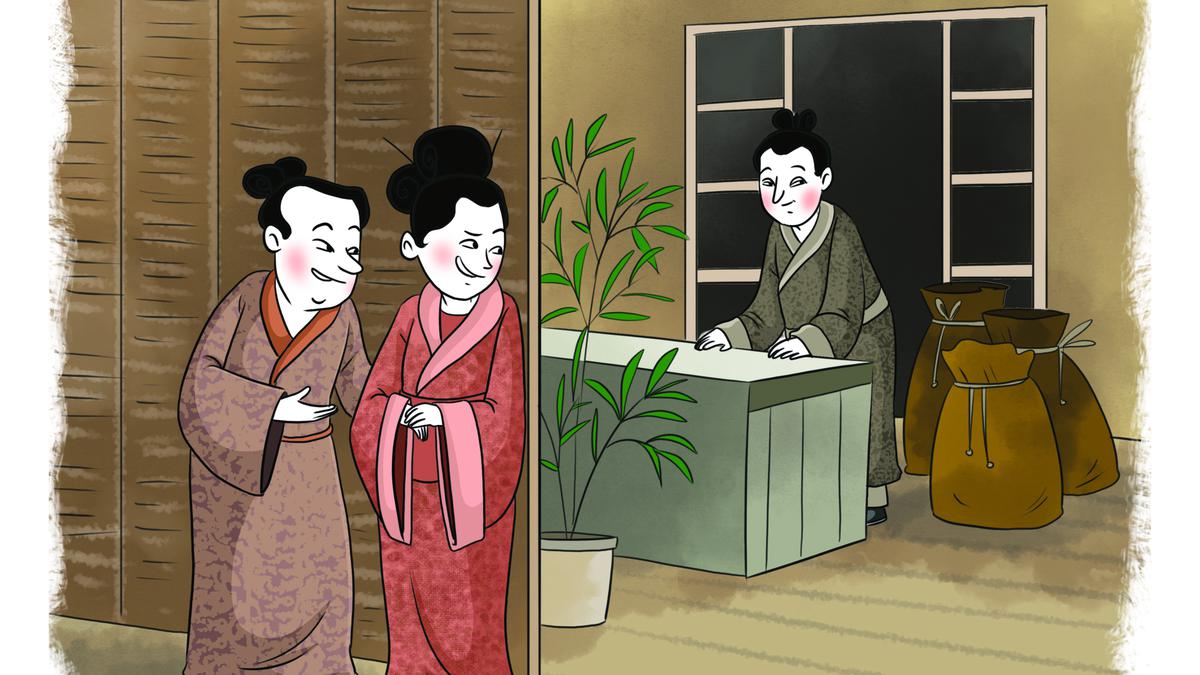
Money matters
The Hindu
Enki, a merchant, set off from his village to the Nokomise Dori market to sell his merchandise. He stopped at an inn for the night, where the innkeeper and his wife hatched a plan to take his merchandise. They added a herb to his meal, but Enki was too smart and left without paying his bill.
A merchant named Enki set off from his village to the Nokomise Dori market to sell his merchandise. It was a long and tiring journey. When evening fell, he looked around for a suitable inn to spend the night. He saw a place with light pouring out of its windows and its front door painted with flowers and mountains. He walked in and found the innkeeper at the reception. He asked the innkeeper, “Kind sir, do you have a room for me for one night?”
The innkeeper said that he did. So, the merchant ordered a hot meal and a room for the night. The innkeeper told his wife that a merchant was stopping for the night. The innkeeper’s wife was happy because business had been slack. When she saw that the merchant had a sizeable amount of merchandise with him, she was impressed.
She struck up a conversation with Enki, who told her that he was on his way to the market to sell his wares and that he was hoping to get a good price, as it was valuable. Excited, the woman told her husband, “This is a rich merchant. Let us hatch a plan to take his merchandise.” Now, the innkeeper knew about certain herbs and their properties. So he said, “While we prepare his dinner, let us put this herb called mega into his food. It will make him forget. In the morning, he is certain to forget his merchandise and the money, which he will set aside for the night.”
The innkeeper and his wife took extra care over the meal and added a liberal dose of mega into it. They watched gleefully as the merchant gobbled up the meal. Immediately after he ate, he retired to his room. He placed his merchandise and money on a side table and was soon fast asleep.
When the rooster crowed in the morning, Enki woke up and looked out of the window. He saw that dawn was breaking and the sun was coming up over the distant hills. He quickly got ready and crept down the stairs. There was no one around. Enki slipped out of the front door. When the innkeeper and his wife woke up, they rushed to the merchant’s room. But, to their great shock, the room was empty.
The wife was angry and she shouted at her husband, “You fool! What rubbish you told me about the herb. The man has forgotten nothing!”
The innkeeper said, “It’s not rubbish. He would surely have forgotten something after consuming the herb.”

“Writing, in general, is a very solitary process,” says Yauvanika Chopra, Associate Director at The New India Foundation (NIF), which, earlier this year, announced the 12th edition of its NIF Book Fellowships for research and scholarship about Indian history after Independence. While authors, in general, are built for it, it can still get very lonely, says Chopra, pointing out that the fellowship’s community support is as valuable as the monetary benefits it offers. “There is a solid community of NIF fellows, trustees, language experts, jury members, all of whom are incredibly competent,” she says. “They really help make authors feel supported from manuscript to publication, so you never feel like you’re struggling through isolation.”

Several principals of government and private schools in Delhi on Tuesday said the Directorate of Education (DoE) circular from a day earlier, directing schools to conduct classes in ‘hybrid’ mode, had caused confusion regarding day-to-day operations as they did not know how many students would return to school from Wednesday and how would teachers instruct in two modes — online and in person — at once. The DoE circular on Monday had also stated that the option to “exercise online mode of education, wherever available, shall vest with the students and their guardians”. Several schoolteachers also expressed confusion regarding the DoE order. A government schoolteacher said he was unsure of how to cope with the resumption of physical classes, given that the order directing government offices to ensure that 50% of the employees work from home is still in place. On Monday, the Commission for Air Quality Management in the National Capital Region and Adjoining Areas (CAQM) had, on the orders of the Supreme Court, directed schools in Delhi-NCR to shift classes to the hybrid mode, following which the DoE had issued the circular. The court had urged the Centre’s pollution watchdog to consider restarting physical classes due to many students missing out on the mid-day meals and lacking the necessary means to attend classes online. The CAQM had, on November 20, asked schools in Delhi-NCR to shift to the online mode of teaching.









